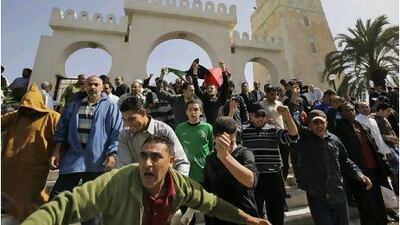TRIPOLI // Muammar Qaddafi's forces battled rebels on several fronts yesterday including an attempt to recapture the closest city to the Libyan capital in fighting that killed at least 18 people. In Tripoli, Qaddafi loyalists fired tear gas and live ammunition to smother an outbreak of protests.
To the east, rebels advanced on an oil port along the Mediterranean coast in their first offensive against Col Qaddafi's military. The fighting at Ras Lanouf left "many dead and wounded", a doctor at a hospital in eastern Libya said and explosions were heard as the two sides battled around the air strip, residents said.
Both sides are pushing against the deadlock that has gripped Libya's 18-day-old upheaval. The rebellion has broken away the entire eastern half of the country from Col Qaddafi's control and has swept over several cities in the west close to the capital.
In Tripoli his loyalists have waged a campaign of terror to ensure that protesters do not rise up in significant numbers.
Yesterday's assault on the rebel city of Zawiya, about 50 kilometres west of Tripoli, appeared to be the strongest yet by Col Qaddafi's forces.
In the morning, troops from the elite Khamis Brigade - named after the son of Col Qaddafi who commands it - bombarded the city's western edges with mortars, heavy machine guns, tanks and anti-aircraft guns, several residents said. By the evening, they had also opened a front on the eastern side. Armed Zawiya citizens backed by allied army units were fighting back.
The commander of the rebel forces - Hussein Darbouk - was shot and killed by fire from an anti-aircraft gun, said Alaa al Zawi, an activist in the city. Mr Darbouk was a colonel in Col Qaddafi's army who defected along with other army troops in Zawiya early on in the uprising.
A witness who was at Zawiya's hospital said at least 18 people in the city were killed and 120 wounded. Libyan state television claimed the attackers had retaken the city. But Mr al Zawi, and other residents said it remained in opposition hands.
Rebels attacked Ras Lanouf in the afternoon, feeling flush with victory after repelling Qaddafi forces who attacked them days earlier at Brega, a larger oil facility just to the east. Fighters armed with Kalashnikovs and heavy machine guns were seen streaming in pickup trucks and other vehicles from Brega heading in the direction of Ras Lanouf.
They battled with about 3,000 pro-Qaddafi troops, mainly around the facility's airstrip, said a resident of the town. As night fell, she said it was not clear who was in control of the complex, which includes a port and storage facilities for crude coming from fields in the deserts to the south.
"We have received three patients so far, hit by rockets. We're probably going to have to do an amputation on one of them," Dr Abdul Fattah al Moghrabi, director of supplies for Brega hospital, said.
"There are many dead and wounded we can't reach because of the firing."
The fall of other parts of the country has made the capital, Tripoli, Col Qaddafi's strongest bastion. His loyalists have taken fierce action to ensure protesters cannot rise up and overwhelm the city. Last week, Friday marches were met by barrages of gunfire from militiamen shooting into crowds, killing a still undetermined number.
Despite a wave of arrests and disappearances since last Friday's bloodshed, more than 1,500 protesters marched out of the Murad Agha mosque after noon prayers yesterday in the Tripoli district of Tajoura, chanting "the people want to bring the regime down".
But pro-Qaddafi forces quickly moved in. They fired volleys of tear gas and - when the marchers continued - opened fire with live ammunition, according to witnesses.
A doctor said several people were wounded and taken to a nearby hospital.
"All these people are threatened with death," said a 35-year-old among the protesters. "We have no education, no economy, no infrastructure. ... We want nothing but the end of the regime. We were born free but he is suppressing us."
"I am not afraid," said another man in the march. "We want to show the world that we are not afraid."Dozens of Qaddafi supporters turned up for a counter-demonstration in Tripoli's central Green Square, waving green flags.
The upheaval is causing a humanitarian crisis, especially on the Tunisian border where tens of thousands of foreign workers have fled to safety.
An organised international airlift started to relieve the human flood. Valerie Amos, the top UN aid official, said 172,000 people, predominantly foreign workers, have fled violence in Libya, most crossing the Tunisian and Egyptian borders - although the rate of those leaving dropped sharply on Thursday when pro-government forces blocked the Tunisian border.
Ms Amos said the "Libyan side is now manned by heavily armed pro-government forces" and said she was "concerned by reports, although as yet unverified, that Libyans inside the country and in the capital are being prevented from leaving".
The undersecretary for humanitarian affairs urged Col Qaddafi to allow people to leave and said that, in the absence of communication with officials in Tripoli, the UN is gathering satellite data on a makeshift camp for displaced people on the Libyan side of the border.
Also yesterday, Interpol delivered a global alert against Col Qaddafi and 15 members of his inner circle to help police around the world enforce UN sanctions aimed at ending turmoil in the world's 12th largest oil exporter.
* With reporting by Associated Press, Reuters and Agence France-Presse and James Reinl at the United Nations

